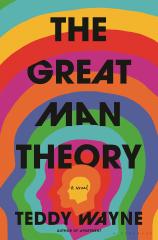The Great Man Theory
Review
The Great Man Theory
The sorrows of a white, liberal, middle-aged, divorced, male academic in contemporary America might not seem like the most absorbing fictional material. But in the hands of Teddy Wayne, it’s an opportunity to create a compelling portrait of a man driven to the brink in a culture that he understands both all too well and not at all.
A professor of English at a “third-rate private college in Manhattan,” Paul is demoted from senior lecturer to adjunct instructor as the novel opens, in the process losing half his salary and his health insurance. His lengthy, erudite creative nonfiction essays on obscure topics once regularly found their way into the pages of low-circulation literary magazines, but even those outlets have become less welcoming to his work.
"...a compelling portrait of a man driven to the brink in a culture that he understands both all too well and not at all.... Part character study, part social satire, THE GREAT MAN THEORY is fully a document of our troubled times."
The one apparent bright spot in his floundering professional career is his contract with a small academic press to publish a book entitled The Luddite Manifesto: How the Age of Screens Is a Fatal Distraction, in which he argues that “our subsuming addiction to screens has, more than any other economic or cultural factor, fostered today’s perilous political climate.” For him, technology is an equal opportunity offender. This self-proclaimed “idealist” condemns the way it has “fomented the rise of right-wing extremism, giving platforms to abhorrent values once disqualified from decent society; neutered the left with a hashtagged resistance that substitutes apoplexy for action; and, perhaps most perniciously, anesthetized us all with spectacle and distraction, blinding citizens to our imminent jeopardy while smothering our desire for progress with an endemic cynicism.”
And Paul’s personal life isn’t any more promising. He lives in a one-bedroom fourth floor walk-up in Brooklyn’s less tony South Slope. This is close to the Park Slope brownstone where his 11-year-old daughter, Mabel, resides with his ex-wife, Jane, and her new husband, who seems to have a knack for getting right all the things Paul gets wrong about life. Mabel, who bears Jane’s last name, is in the process of making the slippery transition from childhood to adolescence. Her weekend visits with her father, as part of a shared custody arrangement, become even more problematic when he decides to vacate his apartment and move in with his octogenarian widowed mother in the Bronx.
Paul meets and eventually begins a relationship with Lauren, a senior producer for a network that’s Fox News in all but name. While moonlighting as a part-time rideshare driver to replace some of the income lost from his diminished teaching status, he hatches a scheme to land himself a spot on “Mackey Live,” the show she produces. Colin Mackey is a Sean Hannity-like talk show host with a massive audience on “the cable network that was a de facto propaganda organ for the president,” someone Paul thinks of as an “unscrupulous ignoramus, who had failed upward over and over in his gauchely charmed life.” Once on the air, in the guise of a right-wing academic, this “curmudgeonly crank,” as his ex-wife calls him, fantasizes about how he’ll bring down the walls of the despised network like a modern-day Samson.
Treating Paul like the proverbial frog immersed in tepid water, Wayne (APARTMENT) gradually but inexorably turns up the heat, as a series of professional and personal mishaps --- everything from a charge of sexual harassment to a hilariously disastrous 12th birthday party for Mabel --- propel him on an accelerating downward spiral. Improbably, this critic of internet addiction turns for solace and approbation to Real News, a social media site where his lengthy, thoughtful posts, at first ignored, slowly begin to attract widespread attention. But every time it appears that Paul’s life might be improving, or at least can’t get any worse, Wayne finds a new way to defeat that expectation, and he manages to produce both winces and laughter over his deepening predicament.
As with all his other dreams, Paul’s plot to infiltrate Mackey’s show doesn’t turn out the way he plans. In the novel’s concluding pages, after conceding that he “wasn’t good at life,” Paul decides to act in an uncharacteristically spectacular way, inspired by the words of the handyman at his former apartment building: “If I don’t fix it, who will?” Wayne graphically portrays the actions of a fundamentally decent man pushed beyond his ability to tolerate any more insults to the self-image and worldview that he’s carefully curated in his 46 years.
Given Paul’s history, it’s no surprise that his “fix” goes wildly awry, bringing what to that point has been a relatively cerebral novel to a dramatic climax. Part character study, part social satire, THE GREAT MAN THEORY is fully a document of our troubled times.
Reviewed by Harvey Freedenberg on July 22, 2022




